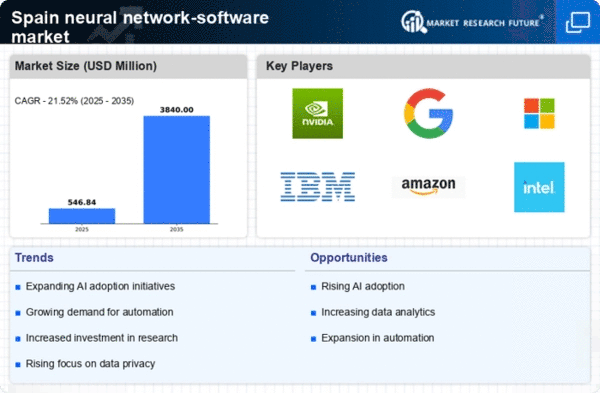Growing Data Availability
The neural network-software market in Spain benefits from the increasing availability of data generated by various sources, including IoT devices, social media, and e-commerce platforms. This proliferation of data presents a unique opportunity for organizations to harness neural networks for data analysis and predictive modeling. With the volume of data expected to grow exponentially, companies are compelled to invest in neural network software that can efficiently process and analyze large datasets. According to estimates, the data generated in Spain is projected to reach 50 zettabytes by 2025, creating a fertile ground for neural network applications. Consequently, the growing data availability acts as a significant driver for the neural network-software market, as businesses seek to leverage advanced analytics to gain insights and make informed decisions.
Advancements in AI Research
Ongoing advancements in artificial intelligence (AI) research significantly influence the neural network-software market in Spain. Research institutions and universities are increasingly focusing on developing cutting-edge algorithms and models that enhance the capabilities of neural networks. This research not only fosters innovation but also leads to the creation of more sophisticated software solutions tailored to specific industry needs. For instance, recent breakthroughs in deep learning techniques have shown promise in improving image and speech recognition applications. The Spanish government has allocated substantial funding for AI research initiatives, which is expected to bolster the neural network-software market. As a result, the continuous evolution of AI research serves as a vital driver, encouraging businesses to adopt state-of-the-art neural network technologies to remain competitive in their respective fields.
Emergence of Edge Computing
The emergence of edge computing is reshaping the neural network-software market in Spain by enabling real-time data processing closer to the source of data generation. This shift allows organizations to deploy neural network algorithms on edge devices, reducing latency and improving response times for applications such as autonomous vehicles and smart cities. As the demand for low-latency solutions grows, companies are increasingly investing in neural network software that can operate efficiently in edge environments. The edge computing market in Spain is projected to grow at a CAGR of 20% over the next few years, indicating a strong potential for neural network applications. Thus, the emergence of edge computing serves as a pivotal driver for the neural network-software market, encouraging innovation and the development of new applications that leverage real-time data processing capabilities.
Rising Demand for Automation
The neural network-software market in Spain experiences a notable surge in demand for automation across various industries. As businesses strive to enhance operational efficiency, the integration of neural networks into software solutions becomes increasingly prevalent. This trend is particularly evident in sectors such as manufacturing and finance, where automation can lead to significant cost reductions and improved productivity. According to recent data, the automation market in Spain is projected to grow at a CAGR of approximately 15% over the next five years. This growth is likely to drive investments in neural network technologies, as companies seek to leverage advanced algorithms for data analysis and decision-making. Consequently, the rising demand for automation serves as a critical driver for the neural network-software market, pushing organizations to adopt innovative solutions that can streamline processes and enhance overall performance.
Increased Focus on Cybersecurity
As cyber threats continue to evolve, the neural network-software market in Spain is witnessing an increased focus on cybersecurity solutions. Organizations are increasingly adopting neural network-based software to enhance their security measures and protect sensitive data from potential breaches. The ability of neural networks to detect anomalies and identify patterns in large datasets makes them particularly effective in cybersecurity applications. Recent reports indicate that cybercrime costs in Spain are expected to reach €10 billion annually by 2025, prompting businesses to invest in advanced security technologies. This heightened emphasis on cybersecurity serves as a crucial driver for the neural network-software market, as companies seek to implement robust solutions that can safeguard their digital assets and maintain customer trust.
















